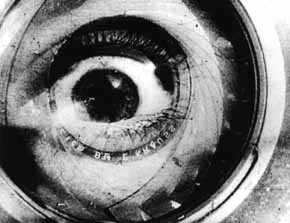
His film opens with a manifesto, a series of intertitles telling us that this film is an "experiment," a search for an "absolute language of cinema" that is "based on its total separation from the language of literature and theater." This manifesto echoes an earlier one that Vertov wrote in 1922, in which he disavowed the films of D. W. Griffith and others as psychological dramas--cliches, copies of copies, films overly indebted to novels and theatrical conventions.



Vertov desired to create cinema that had its own "rhythm, one lifted from nowhere else, and we find it in the movements of things." For Vertov an emphasis on the psychological interfered with the worker's "desire for kinship with the machine." And as a peoples' artist, Vertov felt that the peoples' cinema must "introduce creative joy into all mechanical labor" and "foster new people."
No comments:
Post a Comment